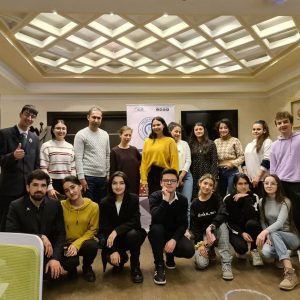During the training, the participants got acquainted with the genres and principles of documentary films. The trainer also talked about the basics of pitching (presentation for finding an investor) scenario and basic requirements for filling out grant applications.
During the practical part of the workshop, the participants split into several groups to create their own documentary history. By the end of the first day, each team already had the title of the film, a logline (a short description of the plot) and a synopsis (script) for potential sponsors.
According to the student of RTSU1 Karina Narzikulova, in two “quickly flown days” Anisa Sabiri was able to convey to the participants her “love for documentary filmmaking.”
“I was already familiar with documentary films, because I took part in the autumn workshop from the MediaSchool CABAR.asia . But I couldn’t miss the opportunity to learn something else. Moreover, with such a coach. Especially offline,” says Narzikulova.
According to Karina, no one on her team knew each other before.
“But this did not prevent us from working harmoniously. We chose the best idea, decided on the genre, each described and presented the hero in his own way, ”Narzikulova notes.
Another integral part of the workshop was the viewing of excerpts from some of the best examples of documentary films. The participants had to highlight the artistic and non-artistic techniques used by the director, determine the genre of the film and express an opinion about the picture.
In the final part, Anisa Sabiri talked about the cinematographic workshops and about the features of work at different stages of documentary filmmaking: pre-production, production and post-production.

“Anisa helped us develop our ideas for the film and taught us to live the hero’s life with him/her, to have compassion for him/her. I have long wanted to make a documentary about Tajik folklore, but I still didn’t know where to start. The workshop helped me create a clear plan of action,” said UCA2 student Zarastin Kholbash.
According to HSE2 student Amiran Karatsev, he has been following the work of Anisa Sabiri for a long time.
“I was very pleased that Anisa taught us according to international, European standards, but at the same time she always made explanations about the specifics of the Tajik segment,” Amiran said.
Several workshop participants already had experience with documentary filmmaking. Some of them have already shot several films, some have long ago decided on the idea of creating their own film.
“I myself was in their place and I know the painful places of a novice filmmaker. Therefore, I tried to convey the program so that, first of all, the children would lose their fear, so that they would be convinced that cinematography is accessible and effective,” says Sabiri.
This training became possible within the framework of the project “Development of new media and digital journalism in Central Asia”. The project is implemented by the Institute for War and Peace Reporting (IWPR) with financial support from the UK Government. Views expressed during project events and / or in project publications do not reflect the official views of the UK Government and IWPR.
[1] Russian-Tajik (Slavonic) University
[2] University of Central Asia
[3] High School of Economics




